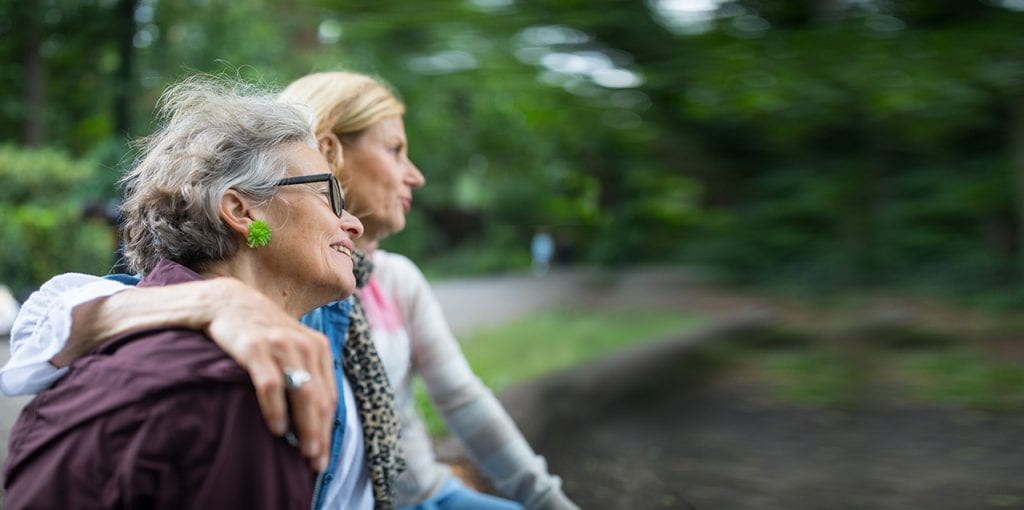Take steps to keep taking part in life outside home
Carers have told us that the person they support can become isolated after their dementia diagnosis. Carers can also feel isolated. Some carers may be worried about things like how the person they support will manage getting transport, finding their way, managing money, communicating and even managing public toilets. There are helpful suggestions for how the person you support can manage symptoms of dementia when out and about in Managing with difficulties when out.
It can be helpful to be aware of possible problems when out and about, however if these worries stop you or the person you support from going out, this can spiral into becoming socially isolated, or even depressed. It is useful to be aware if you or the person you support are avoiding things you previously enjoyed because of the “what if” questions:
- What if the person I support says the wrong thing?
- What if they get lost?
- What if other people don’t understand?
You can take steps to help the person you support keep going out, taking part in activities and meeting friends and family. These steps may help you too. Social contact boosts our physical and mental health!
We share suggestions to help the person you support to keep going out and maintain their social life outside the home. You can also read more detailed suggestions and ideas made by people with dementia for promoting independence in getting out and about here.
It is also important for you as a carer to find time to keep going out and maintain their social life outside the home too. You may do things together, but it can be just as important to take time to continue your own social life too. Read more about taking care of yourself as a carer Taking care of yourself and living well.
Supporting the person if they say or do the “wrong thing”

Start your own dementia toolkit
You might worry about the person you support saying or doing the ‘wrong thing’ or not coping when outside. The person may forget people’s names, lose the thread of a conversation, mistake someone for someone else or behave strangely – such as who was next in line to be served. You may be worried what other people think about this and want to protect the person you support. Situations like this are common and more likely as the person moves forward with dementia. A helpful strategy is to expect them and be prepared to cope with them.
Carers have told us that learning to accept mistakes is important. If you correct the person (when not asked) this can embarrass them and might make the situation worse. If you get stressed the person you support may become even more stressed and situations can quickly escalate.
Margaret found honesty is always the best policy – she or her husband John will say, ”It’s early Alzheimer’s, it’s such as pest of a thing” when things don’t go right. Margaret tells us that almost everyone has a family member who has, or has had dementia, “99% of the time they get it, and they make allowances”.
Derek tries to laugh when things go wrong. He says, “I make light of the situation and that breaks the tension”.
Being prepared can give you and the person you support confidence to keep doing things they enjoy, such as going for a meal, exercising, to the bingo or wherever they like to go to meet up and spend time with other people. A bit of planning can help head off what might become tricky situations. Dementia UK has some helpful tips for eating out at a restaurant with someone with dementia.
Managing other people’s responses
Sometimes it is other people’s reactions and their responses which are unhelpful or even hurtful, rather than a mistake that the person you support makes. Talking about dementia gives suggestions for telling other people about dementia diagnosis. Here we focus on some of the other common conversations you and the person you support will have with others about dementia. It is up to the person with dementia who and how to tell.
Derek decided that going out and doing things he enjoys is more important than the occasional odd look or comment. For difficult situations he says “I take a couple of deep breaths and walk away”.
Consider talking to the person you support about having a ‘buddy’. This could be a friend they normally do things with, who understands dementia and has the confidence to gently step in if required. Buddies can also be paid carers who can go with the person to support with events, activities or just generally getting out and about.
Sometimes, even friends of many years do not cope with the dementia diagnosis. Most carers have told us that while some friends stay, others fall away. Knowing this might make it easier to cope with.
Some carers find they make new friends, especially within dementia friendly groups. In these groups no explanations are needed and there are staff who understand dementia. Dementia friendly groups might be part of the Dementia Friends initiative which helps raise awareness about dementia and making communities, social groups and businesses more inclusive and welcoming.
Some people with dementia and carers prefer to attend dementia friendly groups or activities, where people are more understanding of dementia. You can find local dementia friendly groups by searching here:
Worries about the person getting lost
For people with dementia, finding their way in either new or even familiar places can be challenging. There are ways to help.
- If the person you support owns a smart phone there is navigational help for walking and driving. Practise giving voice activated commands. For example, on iphone, the verbal command “Hey Siri, navigate to my parked car/shop/ particular address” will show directions via a map on the screen
- Suggest the person you support uses their smart phone to take a photo of where they parked the car, the bus stop or the entrance they used to at the shopping centre
- Dogs can be helpful! Ken found navigating about his new retirement village difficult. He enjoyed a walk but hated always asking his wife to go with him. Ken found walking the dog just before the dog’s dinnertime was a reliable way to get home by a particular time
- Make sure there are contact details of a couple of family members/ friends in the person’s wallet or purse, or stored in their smartphone
- Show our “I have dementia card” when asking for assistance; it can avoid giving long explanations
- Some people wear the sunflower lanyard to let others know they have a hidden disability and might need extra time or support. Find out more about the lanyard scheme and how this can be helpful for people with dementia
- Help the person to practice getting to and from places they go to regularly
- Ask a friend, relative or carer to be a buddy.
A practical note about toilets
Even early in dementia, some people find it difficult to work out the pictures used on the signs for ‘men’s’ and ‘women’s’ toilets. It may be helpful to practice recognising the ‘wheelchair’ sign and use the disabled toilets which are unisex and have room for another person to assist if required. Another useful hint is to use the national public toilet map which can help confidence in not being caught short when out and about.
National Public Toilet Map https://www.toiletmap.org.uk/
Use therapies to help people maintain independence
Speech and language therapy and occupational therapy can help the person you support to keep taking part in everyday conversations and activities when they are out and about. This can help them to stay independent and keep doing the things they want to do.
Speech and language therapy
Speech therapy is delivered by trained healthcare professionals called speech and language therapists (SALT). Speech therapy can help the person you support with issues with talking (such as pronunciation), and other ways of expressing themself, and understanding others. Speech therapists can help with word-finding difficulties, if the person finds it difficult telling a story, or following a conversation. They sometimes work with family and friends to improve two-way communication.
Speech and language therapy also offer support with other issues such as swallowing food.
There is growing research on the benefits of speech therapy to improve the communication of people with dementia. This blog explains how a speech and language therapist can help.
Ask the person’s doctor for a referral to a speech and language therapist if they need support with communication.
Occupational therapy
Occupational therapists are trained professionals to help the person you support manage everyday activities. For example, they might help them to use kitchen equipment safely to prepare a meal or practise walking safely outside the house, and practise carrying the shopping home. They might help the person to use their smartphone for navigation using a map app, or keep track of appointments.
Research studies consistently show that occupational therapy helps people with dementia keep doing things that are important to them and delays the need to go into care. Learn more about how occupational therapists may be able to help.
Ask the person’s doctor for a referral to occupational therapy if they need support with daily tasks and activities.
Ask your doctor
Talk to the person you support’s doctor about getting speech therapy or occupational therapy.
Print out the I have dementia card
Ask the person you support if they might carry this and use it when they are out and about
Try some strategies
Reread the article and write down some strategies that you think might be helpful to the person you support when they are out. Then try them out.






